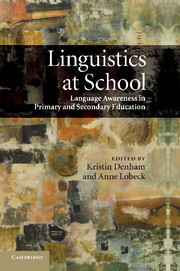Book contents
- Frontmatter
- Contents
- Notes on contributors
- Foreword: The challenge for education
- Introduction
- Part I Linguistics from the top down: encouraging institutional change
- Part II Linguistics from the bottom up: encouraging classroom change
- Part III Vignettes: voices from the classroom
- Introduction to Part III
- 16 And you can all say haboo: enriching the standard language arts curriculum with linguistic analysis
- 17 Code switching: connecting written and spoken language patterns
- 18 A primary teacher's linguistic journey
- 19 Why do VCE English Language?
- 20 Language lessons in an American middle school
- 21 The diary of Opal Whiteley: a literary and linguistic mystery
- 22 Using the Voices of North Carolina curriculum
- 23 A-level English Language teaching in London
- References
- Index
21 - The diary of Opal Whiteley: a literary and linguistic mystery
Published online by Cambridge University Press: 04 August 2010
- Frontmatter
- Contents
- Notes on contributors
- Foreword: The challenge for education
- Introduction
- Part I Linguistics from the top down: encouraging institutional change
- Part II Linguistics from the bottom up: encouraging classroom change
- Part III Vignettes: voices from the classroom
- Introduction to Part III
- 16 And you can all say haboo: enriching the standard language arts curriculum with linguistic analysis
- 17 Code switching: connecting written and spoken language patterns
- 18 A primary teacher's linguistic journey
- 19 Why do VCE English Language?
- 20 Language lessons in an American middle school
- 21 The diary of Opal Whiteley: a literary and linguistic mystery
- 22 Using the Voices of North Carolina curriculum
- 23 A-level English Language teaching in London
- References
- Index
Summary
Background
Eight years ago I turned to linguistics to help meet the needs of students in my 5th-grade English classes who identified more with math and science than they did with reading and writing. While most of my interest in linguistics centers on using a series of problem sets to give students an opportunity for scientific inquiry, I've also found that linguistic analysis interjects an important but oft-neglected topic of conversation into literature study: an author's grammatical choices. In the United States, teachers, and therefore their students, generally think of grammar as fixed and are not aware of the questions they might ask about grammatical choices. Consequently, conversations about literature focus on questions of narrative found in novels: the author's purpose, the plot, and the search for personal meaning in the themes of the story. While these are important conversations to have, there is more to explore: examining grammar is among the many ways of reading available to us (Montgomery et al. 2000).
One way of opening up this possibility for other ways of reading is to provide a text where students can't help talking about grammatical choices. The Diary of Opal Whiteley is one such text. I came across this text in 1995, and I've had the opportunity to teach it in both public and private schools and with students ranging in age between 8 and 13.
- Type
- Chapter
- Information
- Linguistics at SchoolLanguage Awareness in Primary and Secondary Education, pp. 264 - 271Publisher: Cambridge University PressPrint publication year: 2010
- 1
- Cited by



